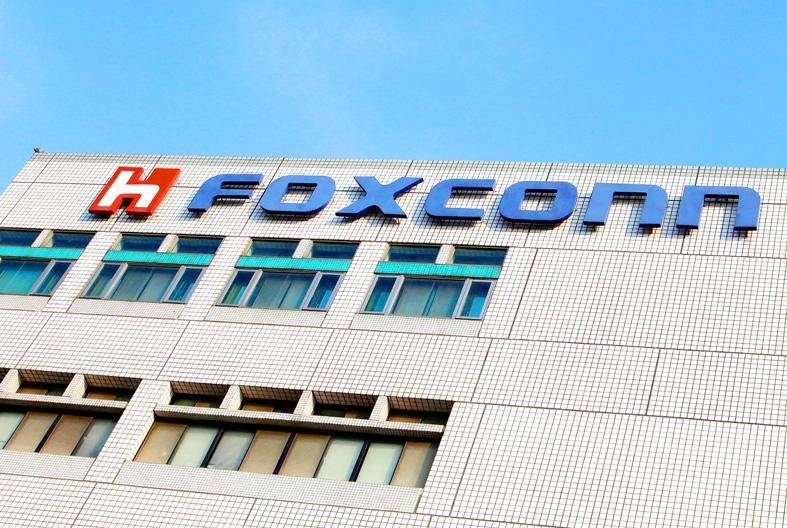Hon Hai Precision Industry Co (鴻海精密) yesterday said that its operations in Shenzhen, China, have returned to normal, as lockdown restrictions implemented after a spike in COVID-19 cases have eased.
Hon Hai shut down its operations on Monday last week after Shenzhen health authorities ordered a lockdown a day earlier, which lasted until Sunday, to fight the worst COVID-19 outbreak the city has seen in two years.
Effective yesterday, all enterprises and institutions were allowed to resume operations, as the city has achieved its goal to contain the disease, local authorities said.

Photo: Nicky Loh, Reuters
In a post to the Taiwan Stock Exchange, Hon Hai said its production in the city, such as those based in the Longhua and Guanlan technology parks, has resumed and work orders have also returned to normal.
The announcement came after iPhone assembler Hon Hai, also known as Foxconn Technology Group (富士康科技集團) on the global market, partially resumed its operations in Shenzhen on Wednesday last week, as workers had been under “closed loop” management, with employees living and working on company campuses.
With the citywide lockdown imposed in Shenzhen last week, more than 60 listed Taiwanese companies that operate in the city had to suspend production.
Other companies that resumed operations yesterday included touch panel supplier General Interface Solution Holding Ltd (業成控股), flexible circuit board material maker Taiflex Scientific Co (台虹科技), and bathroom and kitchen equipment vendor Globe Union Industrial Corp (成霖企業).

The Taiwan Automation Intelligence and Robot Show, which is to be held from Wednesday to Saturday at the Taipei Nangang Exhibition Center, would showcase the latest in artificial intelligence (AI)-driven robotics and automation technologies, the organizer said yesterday. The event would highlight applications in smart manufacturing, as well as information and communications technology, the Taiwan Automation Intelligence and Robotics Association said. More than 1,000 companies are to display innovations in semiconductors, electromechanics, industrial automation and intelligent manufacturing, it said in a news release. Visitors can explore automated guided vehicles, 3D machine vision systems and AI-powered applications at the show, along

AI SERVER DEMAND: ‘Overall industry demand continues to outpace supply and we are expanding capacity to meet it,’ the company’s chief executive officer said Hon Hai Precision Industry Co (鴻海精密) yesterday reported that net profit last quarter rose 27 percent from the same quarter last year on the back of demand for cloud services and high-performance computing products. Net profit surged to NT$44.36 billion (US$1.48 billion) from NT$35.04 billion a year earlier. On a quarterly basis, net profit grew 5 percent from NT$42.1 billion. Earnings per share expanded to NT$3.19 from NT$2.53 a year earlier and NT$3.03 in the first quarter. However, a sharp appreciation of the New Taiwan dollar since early May has weighed on the company’s performance, Hon Hai chief financial officer David Huang (黃德才)

FORECAST: The greater computing power needed for emerging AI applications has driven higher demand for advanced semiconductors worldwide, TSMC said The government-supported Industrial Technology Research Institute (ITRI) has raised its forecast for this year’s growth in the output value of Taiwan’s semiconductor industry to above 22 percent on strong global demand for artificial intelligence (AI) applications. In its latest IEK Current Quarterly Model report, the institute said the local semiconductor industry would have output of NT$6.5 trillion (US$216.6 billion) this year, up 22.2 percent from a year earlier, an upward revision from a 19.1 percent increase estimate made in May. The strong showing of the local semiconductor industry largely reflected the stronger-than-expected performance of the integrated circuit (IC) manufacturing segment,

COLLABORATION: Softbank would supply manufacturing gear to the factory, and a joint venture would make AI data center equipment, Young Liu said Hon Hai Precision Industry Co (鴻海精密) would operate a US factory owned by Softbank Group Corp, setting up what is in the running to be the first manufacturing site in the Japanese company’s US$500 billion Stargate venture with OpenAI and Oracle Corp. Softbank is acquiring Hon Hai’s electric-vehicle plant in Ohio, but the Taiwanese company would continue to run the complex after turning it into an artificial intelligence (AI) server production plant, Hon Hai chairman Young Liu (劉揚偉) said yesterday. Softbank would supply manufacturing gear to the factory, and a joint venture between the two companies would make AI data